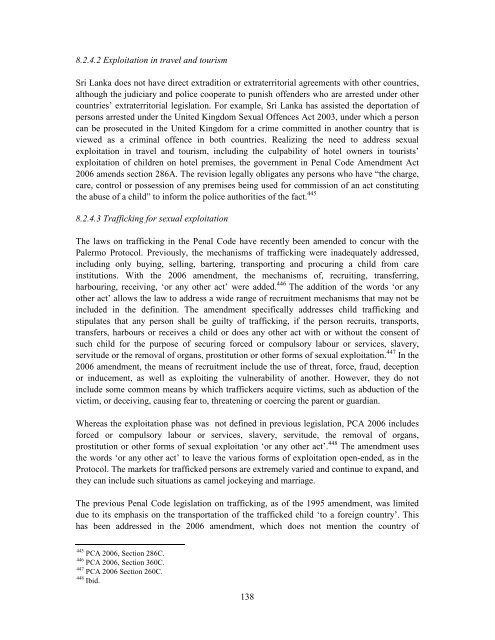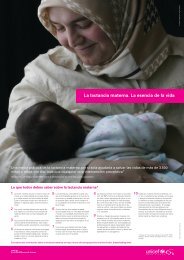SEXUAL ABUSE AND EXPLOITATION OF BOYS IN SOUTH ASIA A ...
SEXUAL ABUSE AND EXPLOITATION OF BOYS IN SOUTH ASIA A ...
SEXUAL ABUSE AND EXPLOITATION OF BOYS IN SOUTH ASIA A ...
You also want an ePaper? Increase the reach of your titles
YUMPU automatically turns print PDFs into web optimized ePapers that Google loves.
8.2.4.2 Exploitation in travel and tourism<br />
Sri Lanka does not have direct extradition or extraterritorial agreements with other countries,<br />
although the judiciary and police cooperate to punish offenders who are arrested under other<br />
countries’ extraterritorial legislation. For example, Sri Lanka has assisted the deportation of<br />
persons arrested under the United Kingdom Sexual Offences Act 2003, under which a person<br />
can be prosecuted in the United Kingdom for a crime committed in another country that is<br />
viewed as a criminal offence in both countries. Realizing the need to address sexual<br />
exploitation in travel and tourism, including the culpability of hotel owners in tourists’<br />
exploitation of children on hotel premises, the government in Penal Code Amendment Act<br />
2006 amends section 286A. The revision legally obligates any persons who have “the charge,<br />
care, control or possession of any premises being used for commission of an act constituting<br />
the abuse of a child” to inform the police authorities of the fact. 445<br />
8.2.4.3 Trafficking for sexual exploitation<br />
The laws on trafficking in the Penal Code have recently been amended to concur with the<br />
Palermo Protocol. Previously, the mechanisms of trafficking were inadequately addressed,<br />
including only buying, selling, bartering, transporting and procuring a child from care<br />
institutions. With the 2006 amendment, the mechanisms of, recruiting, transferring,<br />
harbouring, receiving, ‘or any other act’ were added. 446 The addition of the words ‘or any<br />
other act’ allows the law to address a wide range of recruitment mechanisms that may not be<br />
included in the definition. The amendment specifically addresses child trafficking and<br />
stipulates that any person shall be guilty of trafficking, if the person recruits, transports,<br />
transfers, harbours or receives a child or does any other act with or without the consent of<br />
such child for the purpose of securing forced or compulsory labour or services, slavery,<br />
servitude or the removal of organs, prostitution or other forms of sexual exploitation. 447 In the<br />
2006 amendment, the means of recruitment include the use of threat, force, fraud, deception<br />
or inducement, as well as exploiting the vulnerability of another. However, they do not<br />
include some common means by which traffickers acquire victims, such as abduction of the<br />
victim, or deceiving, causing fear to, threatening or coercing the parent or guardian.<br />
Whereas the exploitation phase was not defined in previous legislation, PCA 2006 includes<br />
forced or compulsory labour or services, slavery, servitude, the removal of organs,<br />
prostitution or other forms of sexual exploitation ‘or any other act’. 448 The amendment uses<br />
the words ‘or any other act’ to leave the various forms of exploitation open-ended, as in the<br />
Protocol. The markets for trafficked persons are extremely varied and continue to expand, and<br />
they can include such situations as camel jockeying and marriage.<br />
The previous Penal Code legislation on trafficking, as of the 1995 amendment, was limited<br />
due to its emphasis on the transportation of the trafficked child ‘to a foreign country’. This<br />
has been addressed in the 2006 amendment, which does not mention the country of<br />
445 PCA 2006, Section 286C.<br />
446 PCA 2006, Section 360C.<br />
447 PCA 2006 Section 260C.<br />
448 Ibid.<br />
138










